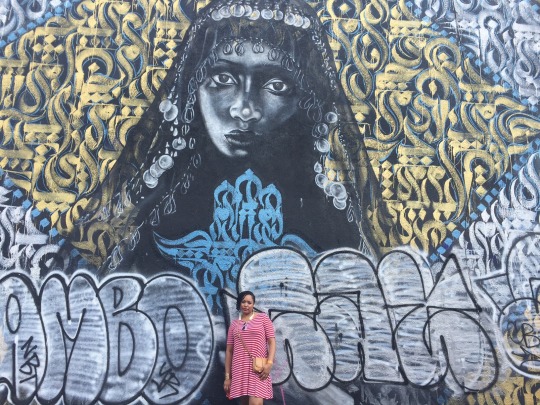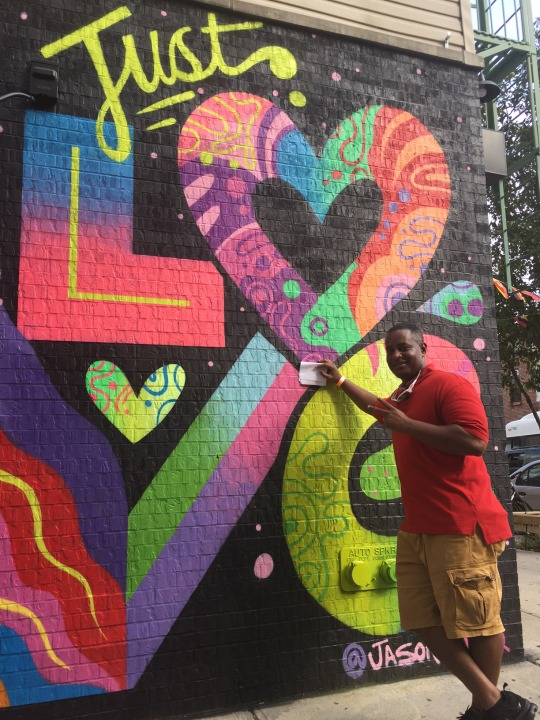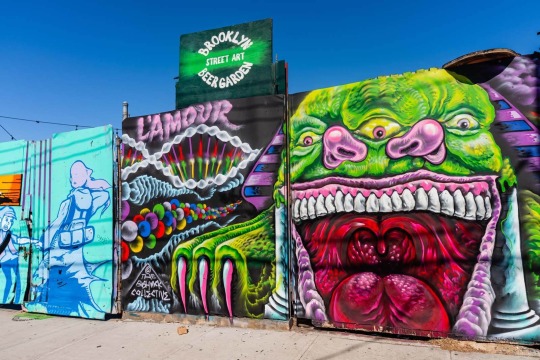Text
Fighting Against Borders (fourth blog)
So now that we know what gentrification is and what significant effects it has on us culturally, socially and financially, what can we do against this vicious cycle of oppression? At the very least we can start by getting to know our neighbors. Knowing our neighbors is what helps to build community bonds. It also helps to understand their needs and are essential to the development of accessible amenities within our communities. Communities need a lead point person. Someone willing to take the mantle and become the community representative. Someone who will become the neighborhood point of contact in expressing a community’s needs. A great place to start becoming engaged in neighborhood concerns would be by attending local neighborhood council meetings. If none exist in your neighborhood begin to organize one. Oftentimes people in particular neighborhoods rarely understand the power they hold in the organization of local neighborhood interest groups. Start with the people in your apartment building. This is also a great way to begin becoming acquainted with your neighbors. Explain to them that you want to bring attention to the community's concerns and interest. Once the organization grows contact your local councilman and express the concerns of the neighborhood.
We can also start making sure our concerns are heard and by holding public officials accountable. Public city planning meetings occur periodically. Attend public city planning meetings through this link https://www1.nyc.gov/site/planning/about/commission-meetings.page. Through these remote online meetings one can voice concerns such as protecting existing affordable housing, ensuring that affordable housing is allotted in new developments and the development of social communal outlets within those developments and throughout a neighborhood remains a focus.
We also need more representatives from the communities being served in the role of “City Planner”. If they are not from the community how can they possibly know and or understand the needs of the particular community? To ensure a neighborhood has a representative expressing it’s unique concerns I propose a solution. City planners servicing a particular area should either reside in the neighborhood they are servicing or should be elected by the board of the local neighborhood council. Both solutions should help in ensuring a representative with the neighborhood's best interest has the proverbial seat at the table. NYC City Planners hold an enormous responsibility. These responsibilities should not be taken for granted nor should it be viewed lightly. The city planner has more wielding power than we may know at first glance. These responsibilities shape neighborhoods and impact quality of life and ultimately shape the lives of future generations. The quality of schools within a particular neighborhood, the amount of schools in a neighborhood, the type of schools within a neighborhood all fall within the scope of the purview of a city planner. City planners also take population trends into consideration and make decisions based on those trends. If the city planner feels that funds to build a new more serving school within a particular neighborhood would be better suited in a neighborhood where he/she feels it may be better served they will make the suggestion to elected officials. They offer long and short term plans for the use of land within the city. What does all of this mean? Ultimately city planners, who are directly responsible for developing and redeveloping communities are the key.
Gentrification has been happening since the dawn of time and it’s going to continue to happen. (In my Thanos voice) We can dread it. We can't run from it. It inevitably arrives. No matter what community you’re in. But I contest that gentrification doesn't need to have a negative stigma attached to it. It can bring new developments into a neighborhood providing more employment opportunities. Those employment opportunities will lead to the circulation of capital to other businesses in the neighborhood. Crime rates will begin to decrease. All of these aspects have positive effects on the community but we must commit to protecting the vulnerable. Let’s formulate new ideas and implement new legislation that can protect the vulnerable. I mentioned earlier that one way to protect people from being pushed out of their homes was to freeze taxes at the amount the taxes were at the time of the purchase of the house. That way the cost of living in the home will not continuously rise forcing families out of homes that they may have saved a lifetime for. Once the house is sold the taxes will rise to the considered market value at the new sale. Continuing that cycle will definitely help to protect families from being pushed out of a home and neighborhood that they love. Offer more rent stabilization programs. Offer more affordable housing units. Offer more employment opportunities. There are so many programs that can be conceptualized and implemented allowing everyone to take advantage of a community's prosperity. Isn’t that idea ultimately what this great country was fundamentally built on?
9 notes
·
View notes
Text
We are ALL in this Together
Gentrification is a symptom of a larger problem. Call it wealth inequality, call it employment discrimination, call it wager discrimination call it whatever, it all comes back to the in effectiveness of our elected officials in leveling the playing field. Years of continued economic disparity causes the financial wealth gap between races to grow even more. Almost to the point of asking the question, How much will the collective disenfranchised lose by? How long before our elected officials acknowledge the financial insecurity of the collective disenfranchised is fragile. How long before it’s acted upon?
While there are some perceived positive effects of gentrification such as raised property values in family homes, the reallocation of funds into the educational system, the possibility for economic growth and a drop in crime rates I would urge caution. These points can be beneficial if ALL were to benefit from it but more often than not these points become the proverbial double edged sword. But if we look closer at these gains we will clearly see that the social effects of gentrification are definite pitfalls. Pitfalls that we as a responsponsible society can not consciously allow to happen in favor of financial gains.
While property values may increase so too are the property taxes. On this point, in my opinion, the negative social effect of the displacement of families outweighs the perceived gains of the imagined rise in property value. Families who may have called a particular neighborhood home for generations are being forced to leave. In this aspect, affected by the government, once again it is those less fortunate, the disenfranchised who bear the brunt of the effects of gentrification. Families gripping to generational wealth built into the equity of the homes being passed down through the family line are being forced to leave based on not being able to afford the increased property taxes. Taxes are being raised based on an imagined estimated rise in property value. In my opinion property taxes should be fixed at a set amount at the time the house is purchased. In my opinion, on the government's part there should be a consideration to do so. It would be helpful in relieving the burdens of these families. Should it be fair that a family lose it’s generational wealth based on the imagined increased value of the home? Lose it’s generational wealth based on not being able to continuously afford the increasing taxes? At what point does property taxes stop increasing?
Another argument in favor of gentrification that can be dispelled is the point of the reallocation of financial resources to the neighborhood schools. Let us think back sixty to seventy years when the more affluent wanted to get out of these neighborhoods due to the influx of minorities moving in. They took their tax dollars with them creating a void in available educational resources provided by the government. The quality of the education system definitely plummeted. Fast forward to contemporary times these same families generations later are still in these communities that they stood fast in helping to create a habitable environment. They will not be able to benefit from the financial promises allocated to the educational system. They will not be able to enjoy them because they will no longer be residents of the neighborhood. What can our government do for these people?
4 notes
·
View notes
Text
“Before Night Falls” by Reinaldo Arenas
“Before Night Falls” is a inspirational story of resiliency against themes of oppression, nationalism and persecution offered by author Reinaldo Arenas. Arenas, a man determined to expose the atrocities of the continuous oppressive generational Cuban dictatorship through the events of his life from childhood through early adulthood. The story sets the tone of truth by a writer who uses his talents for exposition. Reinaldo Arenas’ “Before Night Falls” details painful insightful stories of life in a volatile country.
When critically analyzing and understanding “Before Night Falls” I believe it is important for a brief description of Cuba’s atmosphere while Reinaldo Arenas was a citizen there to understand the gravity of the literature. At the time Cuba’s long standing dictator Fulcencio Batista was a corrupt leader whose greed would lead to his demise. Fulgencio Batista would solely benefit from establishing the financial assets of outside countries within Cuba that the people of Cuba would not benefit from. In addition to the corrupt financial practices, the government's oppressive practices allowed for brutally physical policing tactics against its own citizens. In these accounts of events told from Arenas’ point of view he starts out by detailing how conditions under Batista’s dictatorship were repressive, in the section titled “Politics” Arenas states, “After the death of Chibás, things got easier for the political crooks who always managed, one way or another, to control the island of Cuba. In 1952 a military coup led by Fulgencio Batista brought him to power again, and it became impossible for the Orthodox Party, or any other party, to win elections. Batista’s dictatorship was repressive from the start, not only politically but morally as well” which is the cause for the growing tensions which ultimately led to the revolution of 1959. Reinaldo Arenas continues to describe the oppressive tactics of the government while under the Batista regime, “One day we were preparing ñame [a tropical tuber] cuttings to be planted on the farm, when we saw a couple of country policemen coming our way. That filled us with dread; the police never made social calls”. The cuban dictator while in power would continue to satisfy his greed for money while the people of Cuba would starve because of the lack of opportunities. Arenas goes on to state, “While Batista’s dictatorship continued to oppress the country, the economy deteriorated, at least for poor peasants such as my grandfather or my uncles, who could seldom find work at the sugar mills as cane cutters.” “Things got so bad that my grandfather decided to sell the farm, about a hundred acres, and move to Holguín, where he planned to open a small vegetable and fruit stand”. The oppressive financially unprosperous conditions of life on the island would force families to make impossible decisions. Years of brutality against its own people and the unprosperous condition of the country paved the way for growing tensions by the Cuban people. Those tensions would result in an effort to forcefully remove Fulgencio Batista from power and relieve Cuba of his corrupt reign. That effort would be realized as “The Cuban Revolution of 1959” led by an ambitious Fidel Castro.
Fidel Castro would begin his revolution with promises of a new government. Initially Castro would attempt to forcefully remove Batista from power only to fail. It would be his third attempt that would prove successful. Leading an army of guerilla soldiers, the citizens of Cuba who were camped in the mountains of Cuba, Castro would systematically defeat Batista military forces culminating in the overtaking of Havana the Cuban capital. Through the revolution of 1959 the cuban people liberated themselves from the oppressive clutches of one dictator in Fulgencio Bautista only to pave the way for another future oppressive dictator in Fidel Castro. In the section “The Revolution”, Arenas questions, “Why is it that we, the great majority of the people, and even the intellectuals, did not realize that this was the beginning of a new dictatorship, even bloodier than the previous one?” Initially, One can contend that Castro’s policies could be considered as initially operating solely on behalf of the cuban people. Under his government citizens had substantially more opportunities for employment. The illiteracy rate dropped significantly. Healthcare was provided to the citizens. Also, Cuba’s electrical grid was fully modernized. Cubans received both free healthcare and free education. All initial improvements from the clutches of Batista. On the other hand there was an extremely deep price to pay for these adminities, a price not all citizens would be willing to pay. Progressively cubans would concede civil rights afforded in other countries as their status as the first communist nation in the western hemisphere was confirmed. Fidel Castro would eliminate the government election process leading him to remain in power for the next nearly sixty years. Cubans would no longer have the right to own their own businesses. Cubans who would dare protest the government publicly would flirt with the possibility of being at the very least brutally beaten or even possibly killed. The free press became a propaganda tool for the government. Castro may have started with good intentions but like so many before him he would fall to the lust of power.
So when I begin to take into consideration how Cuba’s atmosphere influenced Reinaldo Arenas body of work I can begin to take in the full gravity of his pain. The overall tone of the feels like a man who knows he's near the end seeking resolution. Resolution for the people of his country to be liberated from a tyrannical oppressor. He states in the introduction of the book, the section titled, “The End”, “One day, eventually, the people will overthrow Castro, and the least they will do is bring to justice those who collaborated with the tyrant with impunity”. He goes on to state, “The ones who promote dialogue with Castro, well aware that Castro will never give up his power peacefully and that a truce and economic assistance are what he needs to strengthen his position, are as guilty as his own henchmen who torture and murder people”. Going further, he’s holding other more influential Cubans who live outside the country responsible as so they're outside of the reach of the dictator they should be more outspoken as to the conditions the vulnerable in Cuba are suffering, “Those who are not living in Cuba are perhaps even more to blame, because inside Cuba you exist under absolute terror, but outside you can at least maintain a modicum of political integrity. All the pretentious people who dream of appearing on TV shaking Fidel Castro’s hand and of becoming politically relevant should have more realistic dreams: they should envision the rope from which they will swing in Havana’s Central Park, because the Cuban people, being generous, will hang them when the moment of truth comes”. The opening of the book comes to a conclusion on this thought through this statement, “The only consolation left for them will be to have avoided bloodshed. Perhaps such an act of justice would be a good lesson for the future, because as a country Cuba has produced scoundrels, criminals, demagogues, and cowards in numbers disproportionate to its population”.
In what I have read so far in chapters one through twelve I believe the cries for help are resoundingly clear in this compelling story of resiliency. Arenas details how during his time in Cuba the government was increasingly and gradually oppressive from one brutal dictator in Batista to another dictator in Castro. Under both dictators, the Cuban people were persecuted for various reasons and various views deemed necessary by the government. As stated earlier, publicly protesting the government would definitely have it’s price. Freedom of speech should be a protected right of the people. Although change is slow it starts out with people voicing their concerns. As government exists for service to the people, citizens should be able to speak out against its governmental institutions at the very moment they feel the government is not operating in the best interest of the people. The function of free speech is to ensure the balance of governmental power remains in effect. Another reason the government would use to persecute its citizens would be one's sexual orientation. Our author, Reinaldo Arenas was a homosexual and he used his talent as a writer to protest to the government through his literature. Knowing that the power of his literature would be able to reach around the world, Arenas would express his dissidence with the Cuban government through his literature documenting his experiences for global consumption. This tale at the time was Arenas’ way of alerting to the world the conditions of the Cuban country and in a way is calling out for help from an oppressive dictator. The Cuban government didn't take too well to the perceived truths revealed in Arenas’s work. Arenas’s collection of literature protesting Cuba’s conditions along with his sexual orientation would eventually lead to his exile from the country he so dearly adored in his childhood.
5 notes
·
View notes
Text
Historical Borders
As we attempt to continue bringing awareness to the term “Gentrification” and the affects it has on cultural aspects we should realize that the concept of gentrification has been happening since Christopher Columbus so called discovered this great land we call home. The vicious efforts of men like Davy Crockett and Daniel Boone even further perpetrated this horrible act. That was a time of a more savage execution of the term “gentrification”. Now this callous act is executed more subtly. It happens slowly over a period of years.
More than two hundred years ago immigrants from other countries migrated here in search of a better life. People from nearly all over the world found a place found a place to call home in NYC. Fast forward a couple of centuries to present day without the fulfilled moral and economical promises not everyone has enjoyed the opportunities of prosperity. Some have been privileged to take full advantage of these opportunities and it has offered them a better life. So in this journey of traveling great geographical distances in search for a better life generations later, for some it was worth it. For others, generations later, they are still searching for a better life. On a metaphorical journey spending their lives stuck in either neutral or going in reverse never having the same opportunities. With the lack of opportunities the result is that one would eventually be displaced from the only place they’ve ever known as home.
Gentrification attacks from many different angles. The economical affects of gentrification takes it toll also. Cultural establishments like the restaurant “Mad Tropical” where we visited were once the pillars of the community and were prosperous and plentiful in Bushwick Brooklyn not too long ago. Now you’ll definitely have to search for a good authentic latinX restaurant as they vanish one by one in what used to be a predominantly latinX neighborhood. It seems like over night the neighborhood has changed. What’s happening to the culture in NYC? A place where authentic cultural flavor used to thrive is now being replaced by corporations bleeding the land of its cultural resources. While pushing out its cultural resources corporations are missing opportunities to fuse with the very communities they inhabit.
In my opinion gentrification is not about protesting to keep one group of people out of a particular neighborhood. God knows this country has had its challenges with that struggle with marginalizing minorities. In my opinion it’s about protecting the vulnerable from the effects of it. The ideal of America hasn't been fully realized yet and in the interim we must continue to hold these ideals true. Creating borders of any kind whether it be social or economical is not what was promised by this great nation. Gentrification does exactly that, create borders. During this countries dark periods people were barred from desirable neighborhoods based solely on the color of their skin. Now, people are being pushing out of desirable neighborhoods based on their economic footing. Which in my opinion is the back door way of keeping people out based on the color of their skin.
7 notes
·
View notes
Text
Bushwick Culture Crawl

Thinking back to better days before the world was put on pause.
The Mrs. and I went on a “Bushwick Brooklyn Culture Crawl”.
Getting off the L train at the “Knickerbocker St. Station” in the summer you can feel it in the air.
Rhythmic Congo beats,
the lifeline and guide of these vibrant streets,
they fill the backdrop of daily latinx life everywhere.

“Love is Color” by Dina Saadi Bushwick Brooklyn at the corner of Knickerbocker and Troutman


“The Brooklyn Way” by @spzero76 at the corner of Knickerbocker and Troutman

Collab by Pocko’s Art and Joel Arista



After walking around we worked up an appetite.
We stopped at “Mad Tropical” (236 Troutman Street) to grab a bite.
Tacos and empanadas fuel the soul.
This is where sweet tamarindo juice is authentically sold
At night it’s a source of rhythmic vibes.
A perfect place to relax and unwind.


Bushwick Brooklyn is a beautiful place.
With culture oozing from everywhere you’ll definitely want to embrace.
If you ever get a chance to walk the graffiti tour I highly recommend the experience.
Looking at all the beautiful vibrant expressions of emotion poured onto the neighborhood walls of resilience.
After the tour stop off at one of the many authentic restaurants and take in the flavor of the natives.
The consumed delicious flavor party in your mouth will be extremely persuasive.
As my cheesy poem attempts to reflect on contemporary times in Bushwick Brooklyn I am reminded it didn’t always look this way. Bushwick Brooklyn wasn't always considered so called “desirable”. It was a neighborhood that showed that promised economic opportunities weren't fully realized by all. It provided a space for those who would claim it out of necessity when it was so called “undesirable”. Like so many urban areas in the country, in an effort to survive these communities were and are forced to live in low cost areas. Opportunities for minorities whether they are home grown or from lands across seas were very scarce for the better part of America's history right up until contemporary times. People of latin and afro identity flocked to these neighborhoods across America looking for a place to call home. From a time when minorities were being taken advantage of by being sold property at astronomical unrecoverable price points or not being sold property at all based on their heritage. Bushwick Brooklyn within the past two decades has transformed itself into an Artsy “Desirable” neighborhood where only those who are well off can afford to live. Historically Bushwick has been a predominant LatinX neighborhood. Take a walk down Bushwick Avenue between Boerum St and Meserole St to see the prosperous non latin restaurants thriving. Or can I suggest strolling down “Graham Avenue”, a block in a neighborhood that is predominantly latin I remind you, affectionately renamed the “Avenue of Puerto Rico” and observe all of the established eateries and lounges of other privileged nationalities other than latin. No, Bushwick Brooklyn was a very different place not so long ago. Restaurants where one can fill on arroz con pollo, arroz con gandules and empanadas were plentiful. That unfortunately, is no longer the case. So now that Bushwick is now considered desirable where can I ask is all the historical cultural flavor?
13 notes
·
View notes